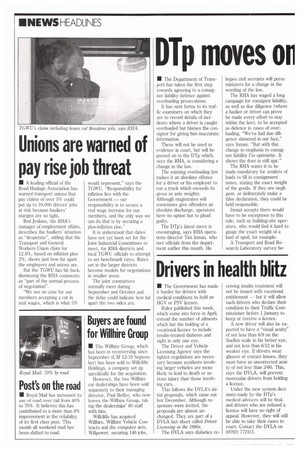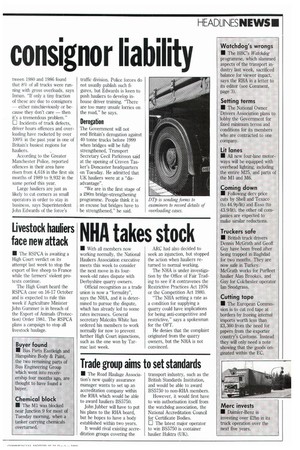Dip moves Oil
Page 6

Page 7

If you've noticed an error in this article please click here to report it so we can fix it.
consignor liability
• The Department of Transport has taken the first step towards agreeing to a consignor liability defence against overloading prosecutions.
It has sent forms to its traffic examiners on which they are to record details of incidents where a driver is caught overloaded but blames the consignor for giving him inaccurate information.
These will not be used as evidence in court, but will be passed on to the Dip which, says the RHA, is considering a change in the law.
The existing overloading law makes it an absolute offence for a driver or his employer to run a truck which exceeds its gross or axle weights. Although magistrates will sometimes give offenders an absolute discharge, operators have no option but to plead guilty.
The DTp's latest move is encouraging, says RHA operations director Tim Inman, who met officials from the department earlier this month. He hopes civil servants will press ministers for a change in the wording of the law.
The RHA has waged a long campaign for consignor liability, as well as due diligence (where a haulier or driver can prove he made every effort to stay within the law), to be accepted as defence in cases of overloading. "We've had due diligence slammed in our face," says Inman. "But with this change in emphasis to consignor liability I'm optimistic. It shows the door is still ajar."
The RHA wants it to be made mandatory for senders of loads to fill in consignment notes, stating the exact weight of the goods. If they are negligent, or deliberately make a false declaration, they could be held responsible.
Inman accepts there would have to be exceptions to this rule, such as building-site operators, who would find it hard to gauge the exact weight of a load of spoil, for example.
A Transport and Road Research Laboratory survey be
tween 1980 and 1986 found that 8% of all trucks were running with gross overloads, says Inman. "If only a tiny fraction of these are due to consignors — either mischieviously or because they don't care — then it's a tremendous problem." 0 Incidents of truck defects, driver hours offences and overloading have rocketed by over 100% in the past year in one of Britain's busiest regions for hauliers.
According to the Greater Manchester Police, reported offences in their area have risen from 4,618 in the first six months of 1989 to 9,932 in the same period this year.
Large hauliers are just as likely to cut corners as small operators in order to stay in business, says Superintendent John Edwards of the force's traffic division. Police forces do not usually publish such figures, but Edwards is keen to push hauliers to develop inhouse driver training. "There are too many unsafe lorries on the road," he says.
Derogation
The Government will not end Britain's derogation against 40 tonne trucks before 1999 when bridges will be fully strengthened, Transport Secretary Cecil Parkinson said at the opening of Craven Tasker's Doncaster headquarters on Tuesday. He admitted that UK hauliers were at a "disadvantage".
"We are in the first stage of a £90m bridge-strengthening programme. People think it is an excuse but bridges have to be strengthened," he said.
































































































